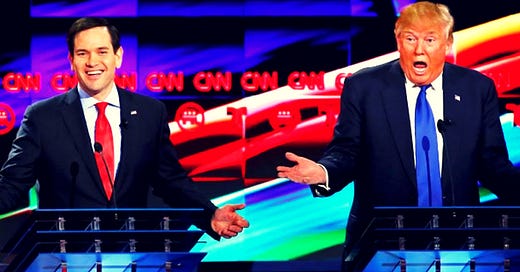
In a piece I wrote last October, I presented the argument that of all the GOP presidential candidates that primary voters had to choose from in the election, Donald Trump was the last person Republicans should have trusted to take on Obamacare.
The nominee rarely talked about the issue during the campaign, despite opposition to the Affordable Care Act being a big reason for why the GOP had made significant gains in congress since 2010. And when Trump did weigh in on healthcare, his rhetoric was usually incomprehensible. Though vowing to repeal the ACA (on grounds of costliness and government restriction), he complimented government-run single-payer coverage and promoted universal healthcare. He even took opportunities to parrot left-wing talking points, equating Republicans' free market ideas to letting people “die on the sidewalks.”
Though Candidate Trump's reflexively liberal stances on various topics were well-documented throughout the campaign, the broader picture on healthcare seemed to be that he neither understood nor particularly cared about the issue. After all, Making America Great Again wasn't about details or serious plans, but rather harnessing populist sentiment. Trump understood that it's much easier to demagogue a complicated concern than it is to offer a credible solution (especially one that involves rolling back a government entitlement). So, he punted. And many on the Right shrugged.
Six months into the Trump presidency, despite multiple attempts to pass healthcare-reform legislation, GOP majorities in the House and Senate haven't been able to get the job done. They're about to head home for their Fourth of July recess with nothing beyond a continually changing bill to show for it.
The are a few reasons for this, including too much disorganization and little consensus within the Republican party, and the shameless scare tactics of the Democratics (including the disgusting claim that GOP reform will literally "kill" people). But perhaps the biggest problem — as I had worried back in the election-cycle — is Trump himself.
Part of the issue is the president's chronically low approval numbers. They're symptomatic of the lack of trust Americans have in him. Trump's petty conduct, his dishonesty, and the needless fights he picks have assisted the media in expending his political capital. Obamacare now has more public support than ever before, in large part because of that trust deficit.
Another element — a big one — is that the man who ran for the White House as a consummate deal-maker appears to have little idea of what he's doing.
Reporting for The Weekly Standard earlier this week, Andrew Egger wrote that "the president’s efforts are hindered by the fact that he seems to care more about signing a bill than he does about the policy issues at stake. Several senators who have spoken with Trump about the evolving legislation describe an executive with little apparent understanding of the basic principles of the reforms and virtually no understanding of the details."
This shouldn't come as a surprise to anyone who has listened to Trump's vague healthcare remarks. At times, the president can't even seem to agree with himself on the matter, categorizing a version of the House-passed bill that he supported as "mean."
Speaking to Republican senators at the White House the other day, the president said of the struggling legislation, "This will be great if we get it done. And if we don’t get it done, it’s just going to be something that we’re not going to like, and that’s okay, and I understand that very well."
I can't imagine such remarks instilled a lot of confidence.
Of course, it's not fair to place all of the blame on Trump. Paul Ryan and Mitch McConnell have also made mistakes, seemingly caught unprepared to effectively deal with an issue that Republican candidates had been running on (and winning with) for eight years.
But President Trump is the leader of the party. His failure to understand the inner-workings of a bill that he claims is great, and effectively communicate that greatness to the electorate, has become a major hindrance. Trump may be a strong salesman when it comes to himself, but when advocating for policy, the results haven't been particularly good.
Also at fault: Republican voters. Yes, you.
If the issue of healthcare were as important to Republicans and conservatives as we had been insisting for years, we would have nominated someone who had some passion (or at least enough interest to understand it) to help lead the effort against Obamacare. We didn't do that. We instead (at least a plurality of us) got behind the guy who repeatedly said (on the few occasions when he actually talked about healthcare) that he was going to cover "everyone" and that the "government will pay" for it. Not exactly "repeal and replace" rhetoric.
Whether or not you believe that other Republican candidates would have defeated Hillary Clinton (I personally think several of them had a good shot), we shouldn't be at all surprised that President Trump has been this weak on the issue. He doesn't care or know enough about it to effectively sell reform ideas — not to his party's leaders and not to the constituents they work for.
Thus, there's a pretty good chance that when something eventually does get passed, the bill will look even more like Obamacare than the current one does...and a lot less like what Republican voters have been demanding for nearly a decade. Something tells me that the president and his most loyal supporters would be perfectly fine with that, but it would be a huge failure for both the party and the country.












